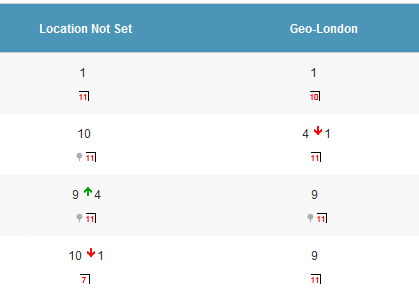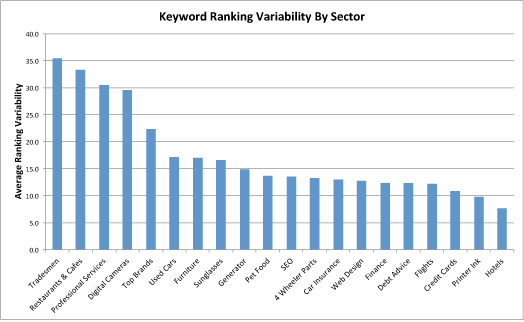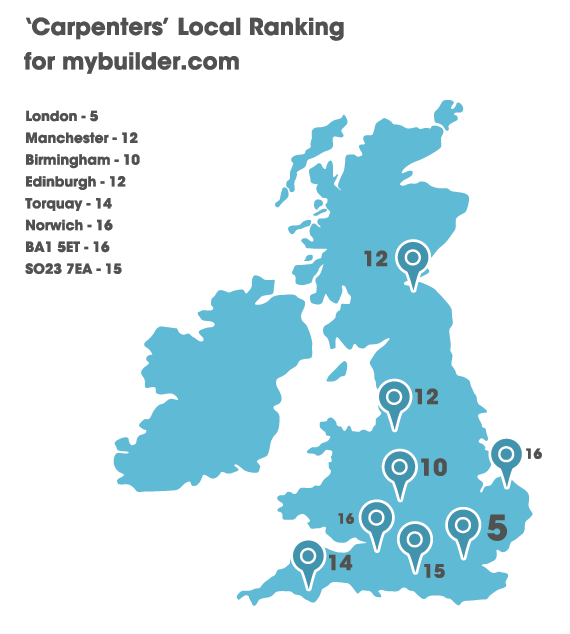 This week, Matt Roberts, VP of Product at Linkdex, explains who stands to benefit from Geo-Rankings. Earlier this year at SES London – around the time Google were launching their Venice update – we had some conversations with SEOs and became aware of the problem of localised rankings.
This week, Matt Roberts, VP of Product at Linkdex, explains who stands to benefit from Geo-Rankings. Earlier this year at SES London – around the time Google were launching their Venice update – we had some conversations with SEOs and became aware of the problem of localised rankings.
What Google had started to aggressively roll-out was a change large enough to affect every searcher in the world, but subtle enough that not many noticed.
Since Venice, Google have been returning different SERPs for each searcher based on their location. And because most SEOs track rankings with a single-location data centre we’ve all been receiving ranking reports biased to one location.
It’s because SEOs remain unaware of rankings, visibility and optimisation opportunities that Linkdex looked into this problem and realised the solution was Geo-Ranking.
How is this different from local search?
Though local search is rapidly expanding, it mainly applies to businesses and websites that operate in a small physical location. Local helps restaurants, dentists and tradesmen etc. optimise for their region by creating Google+ Local pages and ensuring they have citations and reviews in the area.
Geo-Rankings on the other hand is for any site in the world that wants to understand their rankings (and therefore visibility and traffic) for different demographics. Having said that, though this innovation opens the door for new insights, it will help some more than it will others.

The problem of keyword variability
To really explore the problem and see how much it affected different verticals, the Linkdex team joined several high-profile contributors and conducted a white paper study. One of the main issues to analyse was keyword variance. This is the extent to which keyword searches returned different SERPs in different search locations.
We looked at keyword variance across several verticals and though the highest keyword variance was for ‘local’ industries, e.g. cafes and tradesmen, there was also a surprisingly high variance for top brands and retailers who sold items such as digital cameras and sunglasses.
- 67% of the time, if you rank in the top 30 for a keyword in one location you will NOT rank for that keyword across all other locations.
- When location is not set, the average keyword ranking deviates by 4 positions compared to the locations specific ranking.
- Out of the 2,000 keyword phrases tracked across 10 locations, not one had a consistent set of rankings in the SERPs.
These statistics again suggest that the problem affects everyone to some extent, but who should be worried the most? Who doesn’t need to track geo-rankings? Who doesn’t even track rankings at the moment?

Who cares about rankings?
Forget about Geo-Rankings for a minute, some SEOs don’t track rankings at all. Since Google started to alter the SERPs based on factors such as location, personalisation and search history, rankings have become a problematic KPI to report. Especially for SEO agencies when their data centre puts the client’s website at position 2 and the CEO is sat at home in a different location, wondering why his site is appearing at position 6.
But with Geo-Ranking data SEOs can report rankings more accurately and understand (or explain to clients) why different searches return altered rankings across various areas.
Others bemoan rank tracking because it detracts from the focus on traffic and conversions. But I believe that it’s better to report more data and explain the caveats than ignore a metric that could identify powerful new ranking, traffic and conversion opportunities.
And ultimately that’s what it’s all about – not using rankings as a KPI, but using it to spot opportunities (aka problem locations) and optimise your site with those regions in mind to gain more traffic and conversions.
“It’s important for us and clients to be aware of Geo-Ranking variations so as to identify opportunities to optimise locally but rankings alone will not be the key measure of success of an SEO campaign.” David Towers – Head of SEO for MEC Global
Local businesses or agencies with local clients
For local businesses that have always focused on Google+ Local (aka ‘Places’) pages, reviews and citations, Geo-Rankings can provide powerful complimentary insights. Suddenly you have the ability to measure your rankings in the locations that matter to you. For example a London restaurant can now see where they rank in Fulham, Hammersmith, Chelsea, Battersea or any specific post code they like.
Once local businesses and websites have access to this granular data they can see where they’re struggling to appear and then optimise for that location. The same goes for agencies with local clients. How great would it be to give your clients a report outlining their rankings for the keywords they care about in their local area?
Even more exciting is that we’re suddenly seeing local businesses ranking for difficult head terms, e.g. “Italian restaurant”. Usually these would be impossible to attain, but now that rankings are dependent on the search location, businesses are actually ranking very well for these competitive terms in their local area.
“Geo-Rankings changes the game. This provides the hard evidence that regional-based companies need to effectively target their audience. It also provides companies the means to know if they are getting the most from their SEO agency.” – Matt Bailey, Founder & President, SiteLogic Marketing

Any and every SEO agency
As I’ve probably made clear by now, variable rankings affects quite a lot of businesses and websites! And because of the prevalence of the issue, agencies are starting to find that these insights are hugely beneficial for pitching. If you can identify the problem, show how it affects clients and tell them how you (and only you!) know how to solve it, you can win new business and grow your existing accounts.
Because agencies can understand and pitch this information before anyone else, the opportunities to acquire new business are almost infinite. By analysing keyword variance, agencies can see which verticals are susceptible to ranking changes and offer to help the brands in those markets.
On a day-to-day basis Geo-Ranking data is a great metric to track and report on. Though you may not want to use it as a KPI, SEOs will find that the best application is in identifying new optimisation opportunities and seeing how rankings change as a result of your efforts.
“All search is local to the individual searcher, and in that sense Geo-Ranking has already been affecting our work for clients… using this data will increase our utility to clients and therefore our value in the marketplace.” – Anne F. Kennedy, Co-author, Global Search Engine Marketing
National / international companies
This is where we see rank tracking reach a vast new audience. Where SEOs and local businesses might have been tracking rankings and optimising for location before, now national and even international businesses should be analysing their keyword variance and looking at how they rank in the locations where they trade.
Any business with a variable keyword market, e.g. digital cameras, should be tracking geo-rankings. Apart from businesses in those verticals we analysed in the white paper, businesses should analyse their keyword market with Linkdex to understand the vertical’s variance.
The same goes for any national company that has multiple franchises or retail outlets in different locations. With Geo-Rankings they can look at each area they have a physical presence and check their rankings to see if they appear.
Perhaps poor performance in a store is due to poor rankings online, or vice versa? It will surely be fascinating for businesses to measure their performance in different regions to their online visibility.
But ultimately it’s the new opportunities in different geographies that will most excite national businesses and their agencies. If a company’s headquarters are in Manchester, also the location of their highest sales, can they create pages and build links for all of their other stores? Think of the potential for new business and conversion rates if SEOs can suddenly improve rankings for thousands of locations instead of one.
“Whilst the overarching focus will always be the business metrics, Geo-Ranking insights will provide the additional data required to allow us to focus on how we can increase visits and conversion at local level.” – David Freeman, Head of SEO & Affiliates for MPG Media Contacts
Business without a physical presence but a business interests
Another big group of potential Geo-Ranking users are the businesses that don’t have a physical address in a location but make a lot of money by servicing it.
Travel companies are the best example of businesses that don’t have a physical location but have an interest in geography because it’s a destination. Others are businesses that offer services that are often bought locally but can also be serviced by businesses with a large drive radius.
So who cares?
The businesses that will exploit Geo-Rankings are local businesses, national companies with multiple locations, businesses that have non-physical interests in locations like travel companies, agencies and SEOs. However, some will benefit more than others. In the end, it will depend on the keyword variability in your vertical and your existing rankings and visibility.
Agencies can use it to pitch for new business, report on rankings and help local businesses rank for the keywords they care about in their local area. Whereas businesses will be keen to understand their Geo-Rankings and measure this against regional performance.
Either way, the innovations that have been developed out of those initial conversations at SES London can help SEOs around the world to incorporate local data in their search strategies and identify new opportunities to optimise sites in order to increase rankings, traffic and conversions.
Try it for yourself. Check the rankings for a search term across two different locations with this free tool from Linkdex. Let me know what you think, please share your thoughts below.
The views expressed in this post are those of the author so may not represent those of the Koozai team.
Image Source
World globe vector illustration via BigStock
Leave a Reply